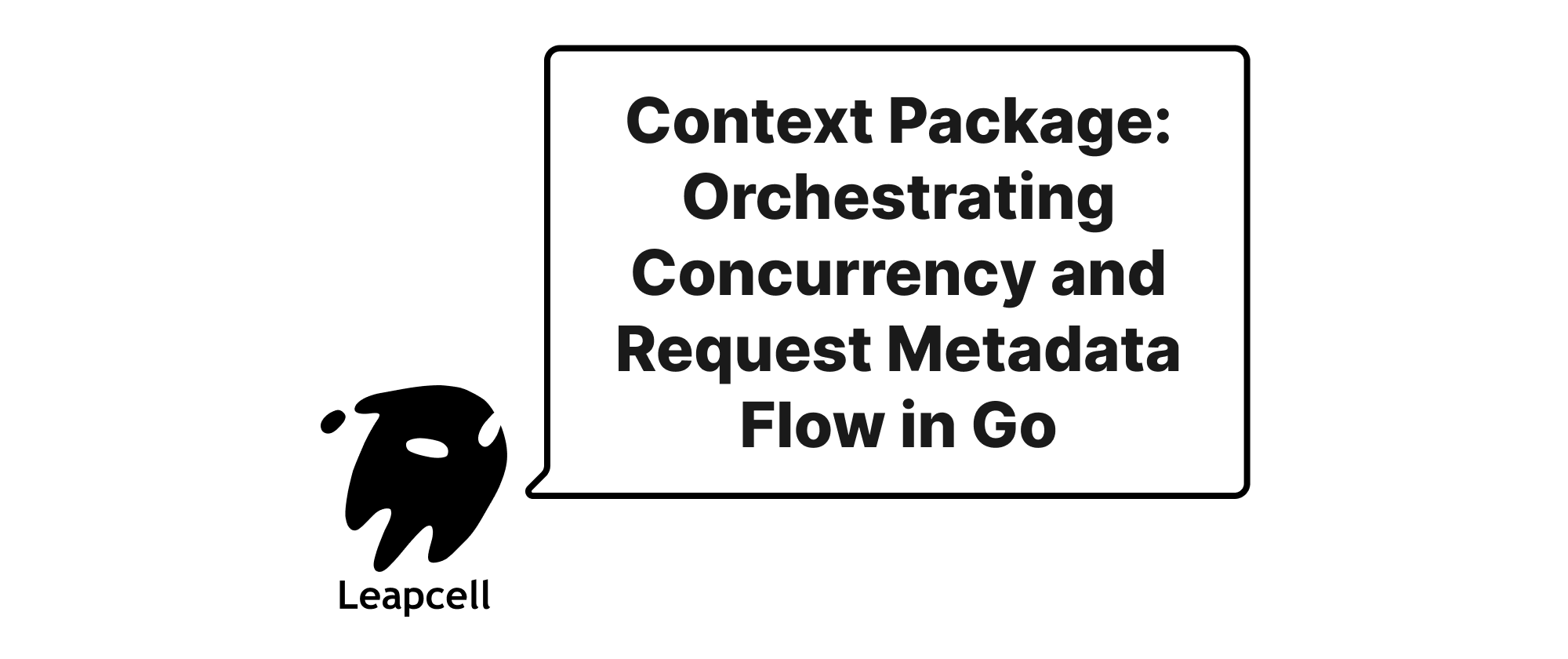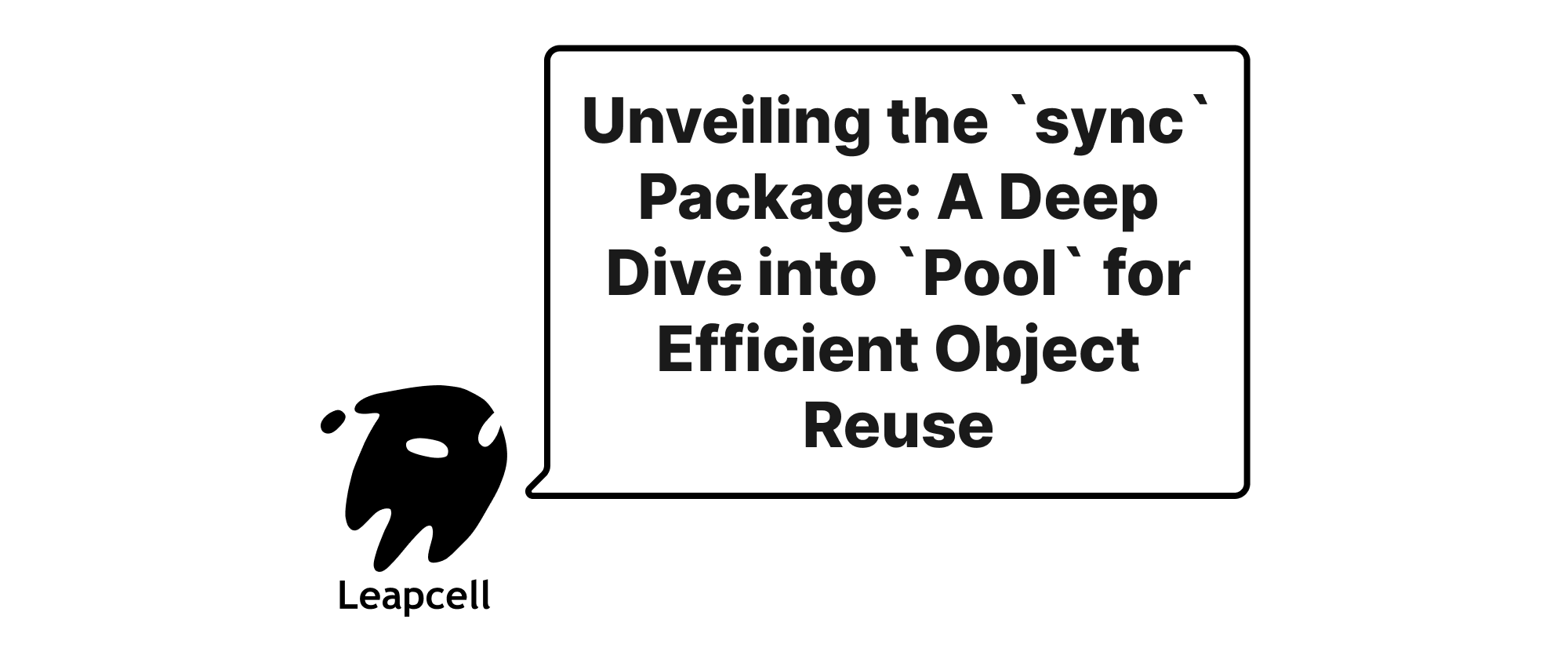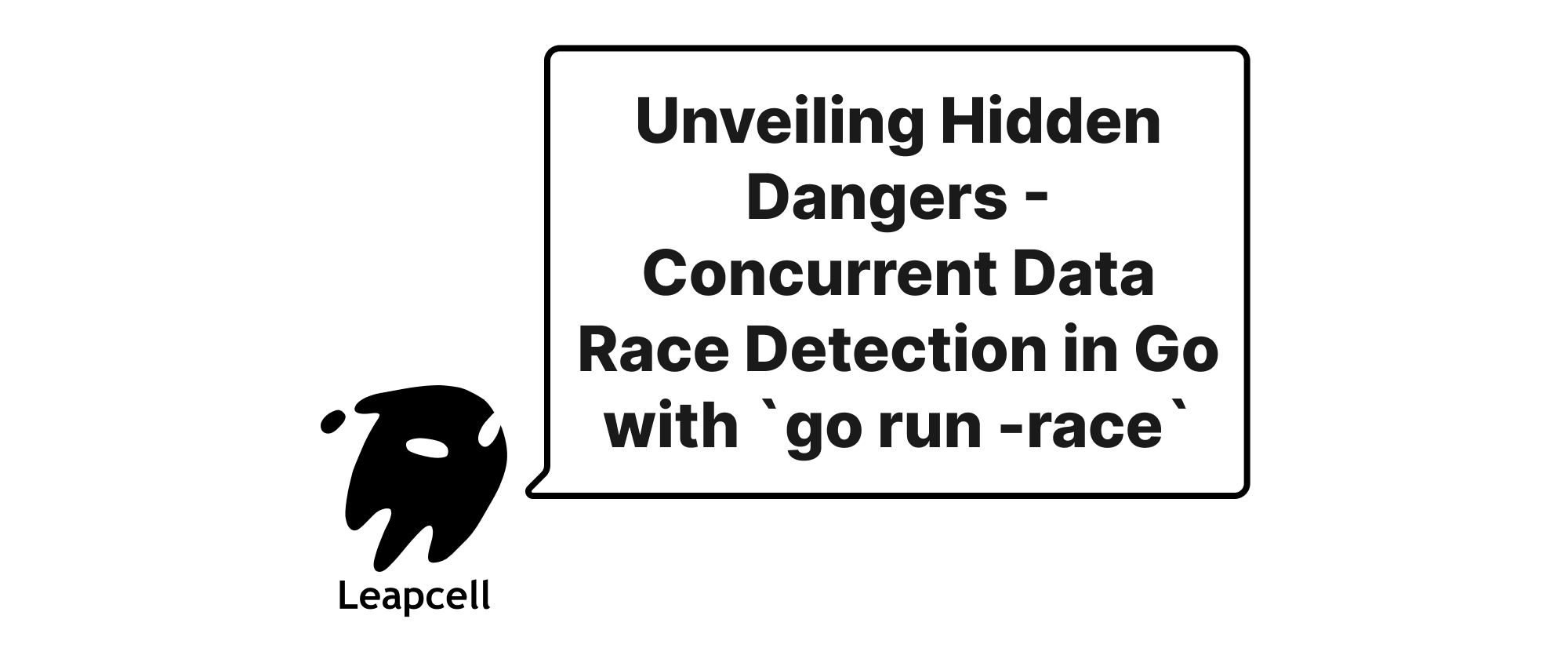Unveiling the Power of Go's Context Package: Concurrency Control and Request Metadata Propagation
Min-jun Kim
Dev Intern · Leapcell

The Go context package is a cornerstone of robust concurrent programming and distributed system development in Go. While its name might suggest a simple container for contextual information, its true power lies in its ability to manage goroutine lifecycles, propagate deadlines and cancellation signals, and efficiently pass request-scoped metadata across the call stack and goroutine boundaries. Understanding and effectively utilizing the context package is paramount for building performant, reliable, and gracefully shutting down Go applications.
The Core Problem: Uncontrolled Goroutine Lifecycles and Metadata Silos
Without a mechanism like context, Go programs often face two significant challenges:
-
Uncontrolled Goroutine Proliferation: In long-running applications, especially servers handling many requests, goroutines launched for specific tasks might continue running indefinitely if the "parent" goroutine或者a related operation finishes. This can lead to resource leaks, hangs, and unexpected behavior. How do you signal to a child goroutine that its work is no longer needed or that a deadline has passed?
-
Metadata Propagation Headaches: In a typical HTTP request or a complex internal workflow, various pieces of information (e.g., user ID, tracing IDs, authentication tokens, request-specific settings) need to be accessible to different functions and goroutines involved in processing that request. Passing these as individual function arguments becomes cumbersome, prone to errors, and violates the "single responsibility principle" of functions.
The context package elegantly solves both these problems by providing a standardized, idiomatic way to manage these concerns.
A Deeper Look at the context.Context Interface
At its heart, the context package revolves around the context.Context interface:
type Context interface { Deadline() (deadline time.Time, ok bool) Done() <-chan struct{} Err() error Value(key any) any }
Let's break down each method:
-
Deadline() (deadline time.Time, ok bool): Returns the time when the context will be automatically canceled. If the context has no deadline,okwill befalse. This is crucial for implementing timeouts in long-running operations. -
Done() <-chan struct{}: Returns a channel that is closed when the context is canceled or when its deadline expires. This channel is the primary mechanism for goroutines to listen for cancellation signals. WhenDone()closes, the goroutine should cease its work and return. -
Err() error: ReturnsCanceledif the context was canceled, orDeadlineExceededif the context's deadline passed. If no cancellation or deadline occurred, it returnsnil. This provides the reason for cancellation onceDone()has closed. -
Value(key any) any: Returns the value associated with the given key in the context. This is the mechanism for propagating request-scoped metadata.
Building Contexts: The context Package Functions
The context package provides several functions to create and derive new contexts:
1. context.Background() and context.TODO()
These are the two base contexts, serving as the roots of all context trees.
-
context.Background(): This is the default, non-cancellable, empty context. It's typically used at the top level of an application, such as in themainfunction or the initial goroutine for an incoming request. It never gets canceled, has no deadline, and carries no values. -
context.TODO(): Similar toBackground(), but signals that the context should be considered temporary or that the proper context propagation isn't yet in place. It's a placeholder, a "todo" item for later refactoring. In production code, you should rarely seecontext.TODO().
package main import ( "context" "fmt" "time" ) func main() { // A background context - never cancels, no deadline, no values bgCtx := context.Background() fmt.Printf("Background Context: Deadline=%v, Done Closed=%v, Error=%v\n", func() (time.Time, bool) { t, ok := bgCtx.Deadline(); return t, ok }(), bgCtx.Done() == nil, bgCtx.Err()) // A todo context - similar to background, but for signaling incomplete context todoCtx := context.TODO() fmt.Printf("TODO Context: Deadline=%v, Done Closed=%v, Error=%v\n", func() (time.Time, bool) { t, ok := todoCtx.Deadline(); return t, ok }(), todoCtx.Done() == nil, todoCtx.Err()) }
2. context.WithCancel(parent Context) (ctx Context, cancel CancelFunc)
This function returns a new context that is derived from parent. It also returns a CancelFunc. Calling cancel() will close the Done channel of the returned ctx, signaling all goroutines listening to this context (or any context derived from it) to stop their work.
This is fundamental for gracefully shutting down operations or limiting the lifetime of child goroutines.
package main import ( "context" "fmt" "time" ) func performLongOperation(ctx context.Context, id int) { fmt.Printf("Worker %d: Starting operation...\n", id) select { case <-time.After(5 * time.Second): // Simulate work fmt.Printf("Worker %d: Operation completed!\n", id) case <-ctx.Done(): // Listen for cancellation signal fmt.Printf("Worker %d: Operation canceled! Error: %v\n", id, ctx.Err()) } } func main() { parentCtx := context.Background() // Create a cancellable context from parentCtx ctx, cancel := context.WithCancel(parentCtx) defer cancel() // Ensure cancel is called to release resources go performLongOperation(ctx, 1) // Simulate some work, then cancel after 2 seconds time.Sleep(2 * time.Second) fmt.Println("Main: Cancelling the context...") cancel() // This will signal worker 1 to stop // Give a moment for the worker to react time.Sleep(1 * time.Second) fmt.Println("Main: Exiting.") }
Output:
Worker 1: Starting operation...
Main: Cancelling the context...
Worker 1: Operation canceled! Error: context canceled
Main: Exiting.
3. context.WithDeadline(parent Context, d time.Time) (ctx Context, cancel CancelFunc)
Similar to WithCancel, but the returned ctx will be automatically canceled when the specified deadline d is reached. It also returns a CancelFunc which can prematurely cancel the context before the deadline.
package main import ( "context" "fmt" "time" ) func fetchData(ctx context.Context, url string) { fmt.Printf("Fetching from %s...\n", url) select { case <-time.After(3 * time.Second): // Simulate network latency fmt.Printf("Successfully fetched from %s\n", url) case <-ctx.Done(): fmt.Printf("Failed to fetch from %s: %v\n", url, ctx.Err()) } } func main() { parentCtx := context.Background() // Set a deadline 2 seconds from now deadline := time.Now().Add(2 * time.Second) ctx, cancel := context.WithDeadline(parentCtx, deadline) defer cancel() // Important to clean up the context go fetchData(ctx, "http://api.example.com/data") // Main goroutine just waits for a bit time.Sleep(4 * time.Second) fmt.Println("Main: Exiting.") }
Output:
Fetching from http://api.example.com/data...
Failed to fetch from http://api.example.com/data: context deadline exceeded
Main: Exiting.
4. context.WithTimeout(parent Context, timeout time.Duration) (ctx Context, cancel CancelFunc)
This is a convenience function built on top of WithDeadline. It automatically calculates the deadline based on the current time plus the provided timeout duration.
package main import ( "context" "fmt" "time" ) func processReport(ctx context.Context) { fmt.Println("Processing report...") timer := time.NewTimer(4 * time.Second) // Simulate a long, blocking operation select { case <-timer.C: fmt.Println("Report processing complete.") case <-ctx.Done(): timer.Stop() // Clean up the timer fmt.Printf("Report processing interrupted: %v\n", ctx.Err()) } } func main() { parentCtx := context.Background() // Allow 3 seconds for report processing ctx, cancel := context.WithTimeout(parentCtx, 3*time.Second) defer cancel() go processReport(ctx) // Keep main alive long enough for the goroutine to potentially finish or timeout time.Sleep(5 * time.Second) fmt.Println("Main: Exiting.") }
Output:
Processing report...
Report processing interrupted: context deadline exceeded
Main: Exiting.
5. context.WithValue(parent Context, key, val any) Context
This function returns a new context that carries the specified key-value pair. The new context inherits all properties (cancellation, deadline) from its parent. Values stored in a context are immutable; if you want to change a value, you create a new child context with the updated value.
Keys in WithValue should be of a comparable type. For best practices, define custom types for keys to avoid collisions, especially when passing values across package boundaries.
package main import ( "context" "fmt" ) // Define a custom type for context keys to avoid collisions type requestIDKey string type userAgentKey string func handleRequest(ctx context.Context) { // Access values from the context requestID := ctx.Value(requestIDKey("request_id")).(string) userAgent := ctx.Value(userAgentKey("user_agent")).(string) // Will panic if not found or wrong type fmt.Printf("Handling request ID: %s, User Agent: %s\n", requestID, userAgent) // Pass context down to a sub-function logOperation(ctx, "Database query started") } func logOperation(ctx context.Context, message string) { requestID := ctx.Value(requestIDKey("request_id")).(string) fmt.Printf("[Request ID: %s] Log: %s\n", requestID, message) } func main() { parentCtx := context.Background() // Add a request ID and user agent to the context ctxWithReqID := context.WithValue(parentCtx, requestIDKey("request_id"), "abc-123") ctxWithUserAgent := context.WithValue(ctxWithReqID, userAgentKey("user_agent"), "GoHttpClient/1.0") // Call the handler with the enriched context handleRequest(ctxWithUserAgent) }
Output:
Handling request ID: abc-123, User Agent: GoHttpClient/1.0
[Request ID: abc-123] Log: Database query started
Important Note on Keys: Using basic types like string for keys can lead to collisions if different parts of your application (or different libraries) use the same string for different purposes. The idiomatic Go way is to define a non-exported, unexported type for your keys:
package mypackage type contextKey string // Unexported type const ( requestIDKey contextKey = "request_id" userIDKey contextKey = "user_id" ) // Example usage: // func AddUserID(ctx context.Context, id string) context.Context { // return context.WithValue(ctx, userIDKey, id) // } // // func GetUserID(ctx context.Context) (string, bool) { // val := ctx.Value(userIDKey) // str, ok := val.(string) // return str, ok // }
This ensures that your keys are unique to your package and avoids accidental conflicts.
Common Use Cases and Best Practices
1. HTTP Servers and Request Lifecycles
In an HTTP server, http.Request already carries a context.Context. This context is automatically canceled when the client disconnects or the request finishes. You should always derive new contexts from this request context for any background operations related to that request.
package main import ( "context" "fmt" "log" "net/http" "time" ) func longRunningDBQuery(ctx context.Context) (string, error) { select { case <-time.After(5 * time.Second): // Simulate a long database query return "Query Result", nil case <-ctx.Done(): return "", fmt.Errorf("database query canceled: %w", ctx.Err()) } } func handler(w http.ResponseWriter, r *http.Request) { log.Printf("Received request for %s\n", r.URL.Path) // Derive a new context with a timeout for the specific database operation // This context will be canceled if the HTTP request's context is canceled // or if 3 seconds pass, whichever comes first. ctx, cancel := context.WithTimeout(r.Context(), 3*time.Second) defer cancel() // Always remember to call cancel! result, err := longRunningDBQuery(ctx) if err != nil { http.Error(w, fmt.Sprintf("Error querying database: %v", err), http.StatusInternalServerError) log.Printf("Error processing request: %v\n", err) return } fmt.Fprintf(w, "Hello, your query result is: %s\n", result) log.Printf("Successfully handled request for %s\n", r.URL.Path) } func main() { http.HandleFunc("/", handler) fmt.Println("Server starting on :8080") log.Fatal(http.ListenAndServe(":8080", nil)) }
If you open http://localhost:8080 in your browser and then close the tab quickly, you'll see the "database query canceled" message as the r.Context() is canceled by the HTTP server. If you leave it open, the WithTimeout will kick in after 3 seconds.
2. Goroutine Fan-Out and Fan-In
When launching multiple goroutines for parallel processing, context.WithCancel is ideal to coordinate their shutdown.
package main import ( "context" "fmt" "sync" "time" ) func worker(ctx context.Context, workerID int, results chan<- string) { for { select { case <-ctx.Done(): fmt.Printf("Worker %d: Stopping due to context cancellation. Err: %v\n", workerID, ctx.Err()) return case <-time.After(time.Duration(workerID) * 500 * time.Millisecond): // Simulate varying work times result := fmt.Sprintf("Worker %d: Processed data at %s", workerID, time.Now().Format(time.RFC3339Nano)) select { case results <- result: fmt.Printf("Worker %d: Sent result.\n", workerID) case <-ctx.Done(): // Check again, in case context was canceled while sending fmt.Printf("Worker %d: Context canceled while sending result. Discarding.\n", workerID) return } } } } func main() { parentCtx := context.Background() // Create a cancellable context for all workers ctx, cancel := context.WithCancel(parentCtx) defer cancel() // Ensure cancellation if main exits early results := make(chan string, 5) var wg sync.WaitGroup numWorkers := 3 for i := 1; i <= numWorkers; i++ { wg.Add(1) go func(id int) { defer wg.Done() worker(ctx, id, results) }(i) } // Read results for a bit go func() { for i := 0; i < 4; i++ { // Read a few results select { case res := <-results: fmt.Printf("Main: Received: %s\n", res) case <-time.After(6 * time.Second): fmt.Println("Main: Timeout waiting for results.") break } } // After reading some results, or timeout, trigger cancellation fmt.Println("Main: Signaling workers to stop...") cancel() }() // Wait for all workers to finish wg.Wait() close(results) // Close results channel after all workers are done fmt.Println("Main: All workers stopped. Exiting.") // Consume any remaining results for res := range results { fmt.Printf("Main: Consumed lingering result: %s\n", res) } }
This example shows how cancel() causes all workers to gracefully shut down.
3. Propagating Tracing and Logging IDs
Contexts are perfect for passing unique identifiers (e.g., correlation IDs, tracing IDs) down the call stack, enabling consistent logging and easier debugging across distributed services.
package main import ( "context" "fmt" "net/http" "time" "github.com/google/uuid" // go get github.com/google/uuid ) // Define custom context key types type contextKey string const ( traceIDKey contextKey = "trace_id" userIDKey contextKey = "user_id" ) // Simulate a middleware that adds tracing info func tracingMiddleware(next http.Handler) http.Handler { return http.HandlerFunc(func(w http.ResponseWriter, r *http.Request) { traceID := uuid.New().String() log.Printf("[TRACING] New Request - TraceID: %s\n", traceID) // Create a new context with the trace ID and associate it with the request ctx := context.WithValue(r.Context(), traceIDKey, traceID) r = r.WithContext(ctx) // Replace request context with the enriched one next.ServeHTTP(w, r) }) } // Simulate a service layer function func callExternalService(ctx context.Context, data string) { if traceID, ok := ctx.Value(traceIDKey).(string); ok { fmt.Printf("[Service] TraceID %s: Calling external service with data: %s\n", traceID, data) } else { fmt.Printf("[Service] No TraceID: Calling external service with data: %s\n", data) } time.Sleep(500 * time.Millisecond) // Simulate delay } // Simulate a data access layer function func saveToDatabase(ctx context.Context, record string) { if traceID, ok := ctx.Value(traceIDKey).(string); ok { fmt.Printf("[DAL] TraceID %s: Saving record: %s\n", traceID, record) } else { fmt.Printf("[DAL] No TraceID: Saving record: %s\n", record) } time.Sleep(200 * time.Millisecond) // Simulate delay } func myHandler(w http.ResponseWriter, r *http.Request) { // Extract values from context (robustly using type assertion with ok) traceID, traceOK := r.Context().Value(traceIDKey).(string) userID, userOK := r.Context().Value(userIDKey).(string) // This key might not be set by middleware if traceOK { fmt.Printf("[Handler] Request TraceID: %s\n", traceID) } if userOK { fmt.Printf("[Handler] Request UserID: %s\n", userID) } // Propagate context down to other functions callExternalService(r.Context(), "some-data") saveToDatabase(r.Context(), "new-user-record") fmt.Fprintf(w, "Request processed!") } func main() { mux := http.NewServeMux() mux.Handle("/", tracingMiddleware(http.HandlerFunc(myHandler))) fmt.Println("Server starting on :8080") log.Fatal(http.ListenAndServe(":8080", mux)) }
When you hit http://localhost:8080, you'll see the traceID flowing through tracingMiddleware, myHandler, callExternalService, and saveToDatabase, appearing in the logs for each step.
Things to Avoid
- Storing mutable data in context values: Context values are immutable. If you need to change data, create a new child context with the updated value. However, generally, context is for read-only metadata.
- Passing large objects in context values: Context is designed for small, request-scoped metadata like IDs, booleans, or small configuration flags. For large data, pass it as function arguments or use other mechanisms like shared memory or databases.
- Putting a
context.Contextin a struct field: Contexts should flow explicitly as the first argument to functions. Storing them in structs couples the struct to the context's lifecycle and makes it harder to reason about goroutine cancellation. The primary exception is when the struct itself is a context-aware resource manager, like an HTTP client that manages its own request contexts. - Ignoring
ctx.Done()orcancel()calls: Failing to listen toctx.Done()can lead to goroutine leaks. Not callingcancel()for contexts created byWithCancel,WithTimeout, orWithDeadlinecan lead to resource leaks and prevent garbage collection of their associated goroutines.defer cancel()is an essential pattern. - Creating deeply nested context trees unnecessarily: While contexts form a tree, excessive nesting can complicate debugging. Keep the hierarchy logical and directly related to the cancellation or value propagation needs.
Conclusion
The context package is an indispensable tool in modern Go development. It provides a powerful, idiomatic way to manage goroutine lifecycles, propagate deadlines and cancellation signals, and transfer request-scoped metadata across concurrent operations and function boundaries. By consistently passing context.Context as the first argument to functions and diligently handling its cancellation signals, developers can build more robust, performant, and gracefully shutting down Go applications that scale effectively in concurrent and distributed environments. Mastering the context package is a hallmark of truly idiomatic and efficient Go programming.


